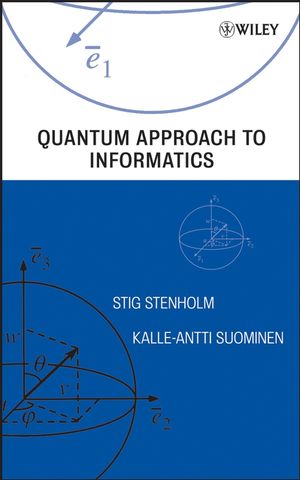Quantum Approach to InformaticsISBN: 978-0-471-73610-3
Hardcover
256 pages
September 2005
 This is a Print-on-Demand title. It will be printed specifically to fill your order. Please allow an additional 15-20 days delivery time. The book is not returnable.
|
||||||
An essential overview of quantum information
Information, whether inscribed as a mark on a stone tablet or encoded as a magnetic domain on a hard drive, must be stored in a physical object and thus made subject to the laws of physics. Traditionally, information processing such as computation occurred in a framework governed by laws of classical physics. However, information can also be stored and processed using the states of matter described by non-classical quantum theory. Understanding this quantum information, a fundamentally different type of information, has been a major project of physicists and information theorists in recent years, and recent experimental research has started to yield promising results.
Quantum Approach to Informatics fills the need for a concise introduction to this burgeoning new field, offering an intuitive approach for readers in both the physics and information science communities, as well as in related fields. Only a basic background in quantum theory is required, and the text keeps the focus on bringing this theory to bear on contemporary informatics. Instead of proofs and other highly formal structures, detailed examples present the material, making this a uniquely accessible introduction to quantum informatics.
Topics covered include:
* An introduction to quantum information and the qubit
* Concepts and methods of quantum theory important for informatics
* The application of information concepts to quantum physics
* Quantum information processing and computing
* Quantum gates
* Error correction using quantum-based methods
* Physical realizations of quantum computing circuits
A helpful and economical resource for understanding this exciting new application of quantum theory to informatics, Quantum Approach to Informatics provides students and researchers in physics and information science, as well as other interested readers with some scientific background, with an essential overview of the field.
Information, whether inscribed as a mark on a stone tablet or encoded as a magnetic domain on a hard drive, must be stored in a physical object and thus made subject to the laws of physics. Traditionally, information processing such as computation occurred in a framework governed by laws of classical physics. However, information can also be stored and processed using the states of matter described by non-classical quantum theory. Understanding this quantum information, a fundamentally different type of information, has been a major project of physicists and information theorists in recent years, and recent experimental research has started to yield promising results.
Quantum Approach to Informatics fills the need for a concise introduction to this burgeoning new field, offering an intuitive approach for readers in both the physics and information science communities, as well as in related fields. Only a basic background in quantum theory is required, and the text keeps the focus on bringing this theory to bear on contemporary informatics. Instead of proofs and other highly formal structures, detailed examples present the material, making this a uniquely accessible introduction to quantum informatics.
Topics covered include:
* An introduction to quantum information and the qubit
* Concepts and methods of quantum theory important for informatics
* The application of information concepts to quantum physics
* Quantum information processing and computing
* Quantum gates
* Error correction using quantum-based methods
* Physical realizations of quantum computing circuits
A helpful and economical resource for understanding this exciting new application of quantum theory to informatics, Quantum Approach to Informatics provides students and researchers in physics and information science, as well as other interested readers with some scientific background, with an essential overview of the field.



